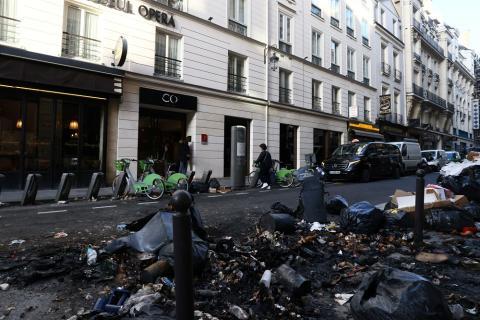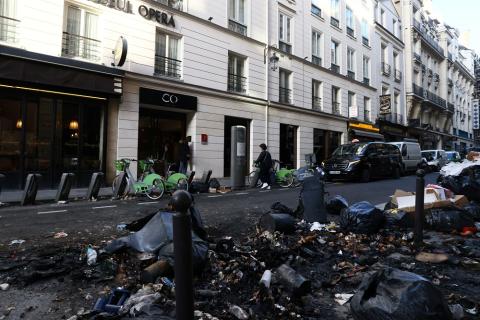
Iran’s ministry of intelligence has said that nine foreign nationals have been arrested in a round up of “agitators” allegedly linked to a wave of anti-government demonstrations that have now reached their third week. It said the detainees included nationals from Germany, Poland, Italy, France, the Netherlands and Sweden.
In a lengthy statement on Friday, the ministry also accused the US of trying to break the Iranian government’s control on the internet.
Thousands of people have taken to Iran’s streets in a wave of protests initially triggered by the death in custody of Mahsa Amini, a 22-year-old Kurdish woman who was arrested by the morality police for allegedly wearing her mandatory headscarf too loosely.
The Oslo-based organisation Iran Human Rights said that 83 people were confirmed to have been killed amid a brutal official response. Iran’s official Fars news agency has put the death toll at “around 60”.
On Friday as many as 15 people were reportedly killed in the town of Zahedan amid the unrest. A general strike has been called for Iranian Kurdistan on Saturday.
Pictures were also circulating of Nika Shakarami, a 17-year-old who disappeared after attending a protest in Tehran on Sep 20. Her body was reportedly returned to her family on Friday, showing signs of torture.
A Iranian speaking to the Guardian said: “This is not calming down. It is spreading. The bravery of the young people on the streets in the face of the security forces is extraordinary. They are behaving like partisans. At first they took off their scarves, but now they are using stones and molotov cocktails. There is no single leadership, but their tactics are becoming more sophisticated”.
Fears that the Iranian regime may eventually attempt a bloody repression of the kind that led to as many 1,500 deaths after protests in 2019 were raised by a group of eminent British lawyers asked to investigate what happened three years ago.
The lawyers, led by Wayne Jordash KC, said their examination of 300 pages of evidence of what happened during the November 2019 protests over a sudden oil price increase showed “the Iranian government’s willingness time and time again to violate human rights to suppress legitimate grievances”.
The Iran atrocities tribunal, led by Jordash, accused 160 individuals including Ebrahim Raisi, now Iran’s president, of being responsible for the 2019 suppression and of permitting torture, physical beatings, planned arbitrary killings, random and reckless shooting with machine guns into large crowds, enforced disappearances, sexual violence and deprivation of liberty.
The panel of seven lawyers said the scale of the repression meant an independent UN tribunal should be established to examine the documented violence and accusations of criminal responsibility.
The panel, which relied on witness statements from Iranians, found that victims’ right to dignity had been deprived by the refusal to provide compensation to their families or provide information on the circumstances of their death. Overall, the planned suppression of widespread protests in at least 11 provinces amounted to a crime against humanity, the tribunal found.
The findings, which are certain to be dismissed by the Iranian government, came as a group of 54 prominent mainly Iranian critics of the regime wrote to the German chancellor, Olaf Scholz, thanking him the verbal support of his government but saying “words were not enough” since credible reports were being received that the regime is again using weapons against its own people.
The group, including the families of German-Iranian dual nationals held in Iran, call on democratic governments to break off negotiations about a nuclear deal and impose fresh sanctions. “Any deal that provides the regime with income that finances the violence against its own people must be terminated,” the group says.
They also call for dissidents in Europe to be given protection and for Iranian representatives including diplomats to be expelled.
Reporting from inside Iran on the latest protests remains hampered by a government shutdown of internet access and the arrest of more than a dozen independent-minded journalists. The government has threatened celebrities including footballers, film-makers and academics for showing solidarity with the cause of the protests.
Iran’s Assembly of Experts, a senior advisory body to the supreme leader, Ali Khamenei, claimed “foreign” powers were orchestrating “sedition”.
The assembly supported the Revolutionary Guards’ recent attacks on areas in Iraqi Kurdistan. The Revolutionary Guards have said they will continue with the attacks until the threat posed by those in camps in Iraq supporting the uprising is eliminated.
Mustafa Hijri, the head of the general directorate of the Kurdistan Democratic party of Iran, said Iran was now in “a decisive war of confrontation” that had paralysed the Iranian regime, and he called for a nationwide strike from Saturday.
The Assembly of Experts urged that Islamic laws and rules be fully implemented across Iranian society.
Iranian reformist newspapers continue to carry interviews with university professors who challenge the claim that the compulsory wearing of the hijab, as enforced by the morality police, is a requirement of the Qur’an or a way to induce morality.
The EU is preparing sanctions aimed at those most closely involved in the suppression of the protests.












